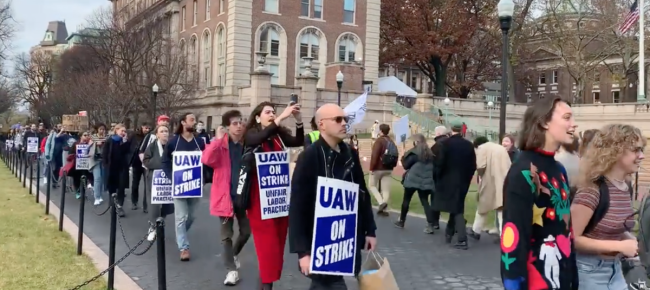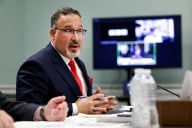You have /5 articles left.
Sign up for a free account or log in.

SWC-UAW/Twitter
The more than five-week-long student worker strike at Columbia University escalated Wednesday, with International Brotherhood of Teamsters members and others joining picket lines across campus in an attempt to shut it down.
Student workers called for the shutdown in response to Columbia’s recent announcement that spring appointment letters will go out as usual—but only to student workers who stop striking by this Friday.
Anyone participating in the strike Friday or beyond will get spring jobs “if available,” according to the memo from Columbia’s human resources department.
Columbia said it set this deadline to “plan covering for the spring term in a timely fashion.” The United Auto Workers–affiliated student union interpreted the deadline as a threat to withhold jobs—and the pay and benefits that come with them—in retaliation for students withholding their labor during the strike.
“We understand this threat to include the possibility that we may be permanently replaced or discharged from our spring positions if we don’t return to work” come Friday, said Johanna King-Slutzky, a Ph.D. candidate in literature at Columbia. “Their timing is transparent. Columbia is desperate to break our strike before finals.”
King-Slutzky said the union has filed two unfair labor practice, or ULP, claims against the university with the National Labor Relations Board, meaning that student workers are “ULP strikers” and are legally protected from being permanently replaced by other workers.
“Should Columbia get away with this,” she said, “it will mean that student workers who continue to engage in legally protected activity will lose their jobs, their health insurance, and be booted out of graduate school, since we cannot afford to remain in school if we lose our income.”
A ‘Rushed,’ Broken Deal
Columbia’s student worker union, made up of graduate assistants and some undergraduates, went on strike last spring over protracted negotiations over a first contract. Key issues for the union at the time were including hourly workers within the bargaining unit, improving students’ health-care packages and winning better pay and protections against discrimination and harassment—including having a neutral arbitrator involved in the complaint process.
In April, Columbia and the union announced that they had reached a tentative contract agreement. But union members rejected this deal in a ratification vote, 1,093 to 970.
The union later said the tentative agreement had been “rushed after a controversial offer by the university to enter mediation in exchange for a strike ‘pause’” and that various bargaining priorities remained: recognition of graduate and undergraduate hourly workers, a bigger pay increase, full dental insurance, and access to neutral arbitration for discrimination and harassment complaints, not just the enhanced neutral review system (as opposed to binding arbitration) to which Columbia assented.
Arbitration for sexual harassment complaints has been a goal for many graduate student organizers since the Me Too movement or before, with these students arguing that universities’ policies and procedures for investigating sexual misconduct are inherently biased in favor of the institution. Third-party arbitration for complaints is the gold standard among these organizers, but it remains elusive. Graduate student workers at Harvard University sought full arbitration options for identity-based discrimination beyond sexual and gender-based harassment and the ability to take sexual and gender-based harassment cases to arbitration during negotiations for their second union contract. The eventual Harvard contract agreement, reached last month, includes a legal support fund for student workers going through sexual harassment and other complaint processes and the option for appellate arbitration for discrimination and harassment cases in which there is new evidence.
Dan Driscoll, vice president of human resources at Columbia, expressed disappointment with that university’s ratification vote outcome, saying that the university had negotiated “in good faith over two years and more than 70 negotiating sessions.”
The Columbia union, meanwhile, hinted at the possibility of future mobilization. This came to be early last month, when the union went on strike again for a first contract.
Concerns About the ‘Standoff’
Pressure has mounted on Columbia to meet the union’s demands since then, with undergraduates, parents, professors and others arguing that it is up to the university to end the strike and allow normal campus operations—including normal undergraduate classes—to resume.
The Columbia College Student Council sent an open letter to President Lee Bollinger and Provost Mary Boyce about the strike on Sunday, for instance, saying that undergraduates have “been deprived of our academic experience” since the strike began. Rather than blaming the union, the council said it is the “sole responsibility” of the university to provide a “quality education and robust campus life.”
The undergraduates’ letter calls on the university to immediately address the fact that the majority of Columbia’s signature core curriculum sections, among other class sections, have not met since Nov. 3. “Students have not had access to discussion sections and recitations, preventing them from fully engaging with course material,” while social events and seasonal campus traditions have been interrupted.
Another letter sent this week to James J. Valentini, dean of the undergraduate college, from the arts and sciences faculty directors of undergraduate studies within the college, says, “[We] are writing to share our concern with the current standoff between the [union] and Columbia University’s central administration. We are especially dismayed that the administration has yet to provide realistic solutions to address the problems that we, our departments, and our students face as the semester draws to a conclusion.”
This letter raises questions about whether undergraduates will be able to get full credit for the fall due to missed contact hours during the strike and says that the curriculum will be greatly impacted if the strike lasts into the spring term. Should that happen, “departments will be forced to cancel courses, eliminate labs, and lower enrollment caps. Undergraduate students will be unable to take classes in which they are currently enrolled, will not advance toward degrees, but will instead confront the sudden upheaval of their long-term curricular plans.”
Columbia recently told undergraduates via email that they could apply a specific pass-fail policy this semester to any course, in “appreciation of how difficult this term may have been for you.” Typically this policy is only applicable to courses outside one’s major or graduation requirements.
The faculty letter to Valentini says departments have made “every effort to imagine ways to ensure the continuity of our students’ education, but must now conclude that we can envision no effective remediation for the present and future losses of learning across our departments.” Yet the university “simply cannot function without its student workers.”
Columbia said in a statement late Wednesday, “We’re committed to working as hard as we can to reach a fair and equitable agreement as soon as possible to end the disruption to undergraduate studies and campus activity. We welcome the union’s willingness to work towards a compromise and intend to respond to their latest proposal this week.”
According to information from the union, the university has presented “essentially a clone of Harvard’s” contract language on harassment and discrimination arbitration and “continues to inch closer to an arbitration system we can consider.” Yet there remains an “ideological difference regarding grievance and arbitration for Title IX cases” in particular, the union says.
On pay, the union began negotiations anew seeking $45,000 for graduate assistants on 12-month appointments and $35,500 for those on nine-month appointments, plus pay parity across programs and schools and annual 3 percent raises. For nonsalaried workers, the union is seeking a minimum pay rate of $26 per hour.
The university estimates that these, among other asks, will cost about $100 million over the life of the three-year contract. Currently Columbia is proposing minimum annual salaries of $42,766 for Ph.D. students on 12-month appointments and $32,074 for those on nine-month appointments, with 3 percent annual increases. It’s seeking to pay nonsalaried student workers $19 per hour, to start.









